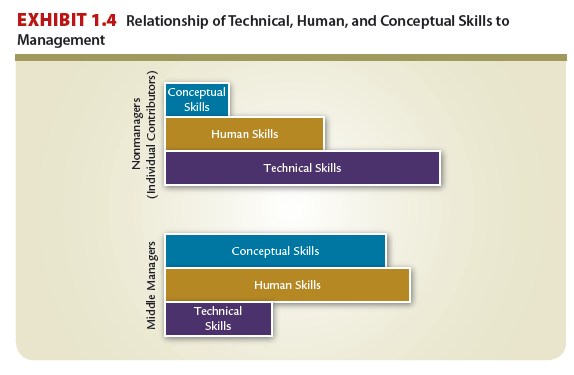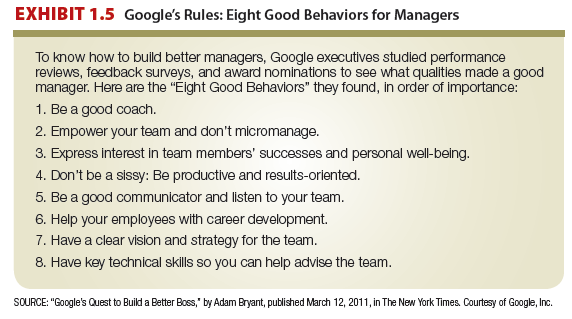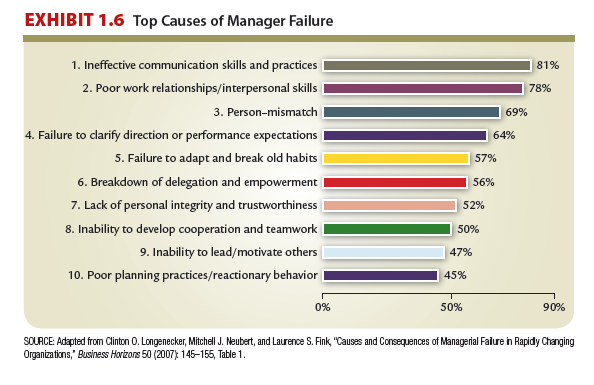A manager’s job requires a range of skills. Although some management theorists propose a long list of skills, the necessary skills for managing a department or an organization can be placed in three categories: conceptual, human, and technical.14 As illustrated in Exhibit 1.4, the application of these skills changes dramatically when a person is promoted to management. Although the degree of each skill that is required at different levels of an organization may vary, all managers must possess some skill in each of these important areas to perform effectively.
When Skills Fail
Good management skills are not automatic. Particularly during turbulent times, managers really have to stay on their toes and apply all their skills and competencies in a way that benefits the organization and its stakeholders—employees, customers, investors, the community, and so forth. In recent years, numerous highly publicized examples have shown what happens when managers fail to apply their skills effectively to meet the demands of an uncertain, rapidly changing world.


Everyone has flaws and weaknesses, and these shortcomings become most apparent under conditions of rapid change, uncertainty, or crisis.15 Consider the uproar that resulted in 2013 from the decision of managers at the Internal Revenue Service (IRS) to apply additional screening to tax-exempt applications from conservative Tea Party groups. When a manager for so-called Group 7822, an IRS office that screens and processes thousands of applications a year from organizations seeking tax-exempt status, noticed a growing number of applications from groups identifying themselves as part of the Tea Party, the manager advised workers to flag them and similar groups to see if their purpose was too political to be eligible under the rules for tax exemption. It has long been a practice to give extra scrutiny to certain kinds of groups that present a potential for fraudulent use of tax exempt status, but critics say the agency went too far in how it applied the practice to conservative political organizations, in some cases delaying applications for years. Congressional investigators are probing whether agency activities constituted discrimination against conservative groups, and the full story of what happened and why is still emerging.16 IRS managers at all levels involved in the decision appear to have needed stronger conceptual skills to prevent this crisis from happening, and higher-level executives had to call upon all their conceptual and human skills to resolve the dilemma and work to restore the public trust.
The numerous ethical and financial scandals of recent years have left people cynical about business and government managers and even less willing to overlook mistakes. Crises and examples of deceit and greed grab the headlines, but many more companies falter or fail less spectacularly. Managers fail to listen to customers, are unable to motivate employees, or can’t build a cohesive team. For example, the reputation of Zynga, maker of games like Farmville that were ubiquitous on Facebook for a while, plummeted along with its share price in 2012. Although there were several problems at Zynga, one was that founder and former CEO Mark Pincus had an aggressive style that made it difficult to build a cohesive team. The exodus of key executives left the company floundering, and the company’s shares fell 70 percent. Pincus stepped down as CEO in July 2013, and former Xbox executive Don Mattrick took over to try to revive the once-hot game maker.17 Exhibit 1.6 shows the top 10 factors that cause managers to fail to achieve desired results, based on a survey of managers in U.S. organizations operating in rapidly changing business environments.18 Notice that many of these factors are due to poor human skills, such as the inability to develop good work relationships, a failure to clarify direction and performance expectations, or an inability to create cooperation and teamwork. The number one reason for manager failure is ineffective communication skills and practices, cited by 81 percent of managers surveyed. Especially in times of uncertainty or crisis, if managers do not communicate effectively, including listening to employees and customers and showing genuine care and concern, organizational performance and reputation suffer.

Source: Daft Richard L., Marcic Dorothy (2009), Understanding Management, South-Western College Pub; 8th edition.

Very nice post. I just stumbled upon your blog
and wanted to say that I have really enjoyed surfing around your blog posts.
In any case I’ll be subscribing to your feed and I hope you write again very
soon!
wonderful and also impressive blog. I really wish to thanks, for
offering us better information.
Way cool! Some very valid points! I appreciate you writing this write-up plus the rest of the website is really
good.
That is very interesting, You are a very skilled blogger.
I have joined your rss feed and sit up for
in the hunt for more of your fantastic post. Also, I’ve shared
your web site in my social networks